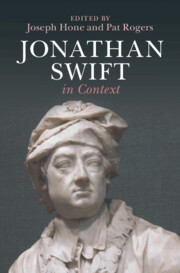Book contents
- Jonathan Swift in Context
- Jonathan Swift in Context
- Copyright page
- Contents
- Notes on Contributors
- Preface
- Acknowledgements
- Chronology
- Abbreviations
- Part I Personal
- Part II Publishing History and Legacy
- Part III Literary Background
- Part IV Genres
- Part V The External World
- Part VI Social and Intellectual Topics
- Chapter 35 Philosophy
- Chapter 36 Science
- Chapter 37 Race
- Chapter 38 Material Culture
- Chapter 39 Gender
- Chapter 40 Colonialism
- Chapter 41 The Body
- Chapter 42 Demography
- Chapter 43 Food
- Chapter 44 Economics
- Further Reading
- Index
Chapter 39 - Gender
from Part VI - Social and Intellectual Topics
Published online by Cambridge University Press: 02 May 2024
- Jonathan Swift in Context
- Jonathan Swift in Context
- Copyright page
- Contents
- Notes on Contributors
- Preface
- Acknowledgements
- Chronology
- Abbreviations
- Part I Personal
- Part II Publishing History and Legacy
- Part III Literary Background
- Part IV Genres
- Part V The External World
- Part VI Social and Intellectual Topics
- Chapter 35 Philosophy
- Chapter 36 Science
- Chapter 37 Race
- Chapter 38 Material Culture
- Chapter 39 Gender
- Chapter 40 Colonialism
- Chapter 41 The Body
- Chapter 42 Demography
- Chapter 43 Food
- Chapter 44 Economics
- Further Reading
- Index
Summary
Swift has often been labelled an outright misogynist. This chapter focuses on how several of Swift’s most misogynistic poems spoke to wider ideas about gender circulating in the early eighteenth century: in particular, the widespread concern that the idolisation of the female sex as paragons of virtue had lifted women well above their capacities in the name of beauty, morality, and social behaviour. The first section, on the idealisation of female virtue, includes an extended reading of ‘Cadenus and Vanessa’, while the second section explores the links between cosmetics and scatology in ‘The Lady’s Dressing Room’.
Keywords
Information
- Type
- Chapter
- Information
- Jonathan Swift in Context , pp. 311 - 318Publisher: Cambridge University PressPrint publication year: 2024
